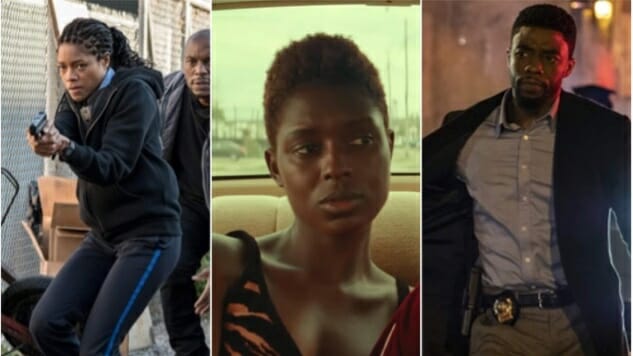Cop Thrillers Are Forced to Reckon with #BlackLivesMatter

Twelve years after the iPhone first began putting a video camera in the pocket of the average American and six years after the founding of the official Black Lives Matter organization, there’s an uncomfortable understanding in this year’s recent slate of crime thrillers that we fear the ones who we’ve hired to patrol our streets. When asked in an interview if he felt conflicted about portraying a black police officer in 21 Bridges, Chadwick Boseman said it required a balanced approach: As someone with police officers in his own family, he knew his portrayal needed to be nuanced, but as a black man in America, he said he’d been stopped for basically no reason just a couple weeks prior to the interview.
Recent movies like Black and Blue, 21 Bridges and Queen & Slim have centered their plots around police violence in a time when it’s been dragged into the light by years of sustained protest and activism. But while they show sense in naming the problem, what they mostly lack is any boldness in framing the problem realistically and saying what we should do about it.

Black and Blue puts Alicia West (Naomie Harris) in the deep end as a rookie cop in New Orleans, with plenty of reminders that Katrina wrecked the place and it’s never recovered. “Nature can be a bitch sometimes,” muses one of her colleagues, when it’s clear it took more than just nature to turn the place into a hopeless slum. When she witnesses other police murder a drug dealer to cover up their own crookedness, her body camera’s footage becomes the hottest MacGuffin in the city. With the local drug kingpin convinced she’s murdered his nephew and betrayed by every last one of her colleagues, Harris turns to Tyrese Gibson’s sympathetic liquor store owner for help. We’re introduced to him mere moments before police barge into his store after his own distress call, immediately treating him as if he’s a burglar and showing absolutely zero remorse after they’ve put a gun on him and scared him witless.
After prolonged chases and betrayals, Harris and Gibson manage to survive long enough for the footage to be uploaded and instantaneously make it to the police chief’s inbox. (It must have been flagged as urgent in Outlook because the chief opens it right away and immediately has the crooked police neutralized.)
Through it all, Harris is met multiple times with other characters’ cynicism about why she even bothers fighting so hard when she could just turn the other way and be fine. Murder’s murder, she insists.
The movie opens with Harris’ character in civilian garb, violently stopped by her fellow officers because she’s a black woman in an affluent neighborhood. It acknowledges that tension, but it also boils down its ultimate conflict to a criminal conspiracy whose villains you can ultimately just shoot. The hot-head officer who hassled Gibson, though, gets one good scare and then is never heard from again.

A recent news investigation in Chicago conducted over the past year showed that Chicago police have a verifiably raided the wrong damn houses, destroying property and terrorizing children even after they’ve realized that, whoops, they were given the wrong address. So it’s important that 21 Bridges establishes that NYPD detective Andre Davis (Chadwick Boseman) is ready to step in just at the right time to stop his fellow officers from roughing up two people who have next to nothing to do with his investigation after they’re woken up from sleep and handcuffed in their own home.
That’s perhaps the most eyebrow-raising moment in the movie, which in its first five minutes establishes Boseman as some sort of destined warrior cop, crying as he buries his father (slain in the line of duty). As soon as the movie skips ahead, we see him remorselessly glare down an internal affairs board that points out he’s killed eight people over the course of his career.
He’s justified in his manhunt, though: He fights tooth and nail to bring his suspects in alive when a cocaine robbery gone wrong ends in the two triggermen slaughtering eight police officers and immediately putting the entire island of Manhattan into lockdown. The slain officers’ superior (J.K. Simmons) is adamant that the guys just die. It turns out, as we know it must, that the reason he wants this is because the robbers inadvertently stumbled upon a vast criminal conspiracy among the police narcotics unit.
-

-

-

-

- Curated Home Page Articles By Test Admin October 21, 2025 | 3:10pm
-

- Curated Home Page Articles By Test Admin October 21, 2025 | 2:57pm
- Urls By Test Admin October 21, 2025 | 2:57pm
- Curated Home Page Articles By Test Admin October 21, 2025 | 2:55pm
-

-

-

-

-

-

-

-

-

-

-

-

-

-

-

-

-

-

-

-

-

-

-

-

-

-

-

-

-

-

-





































